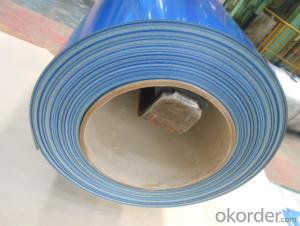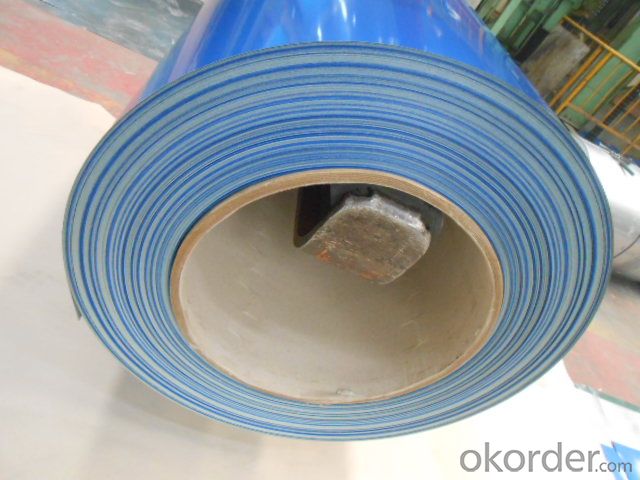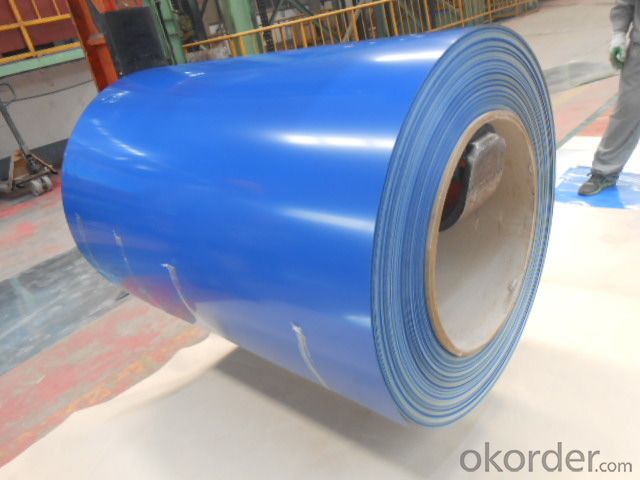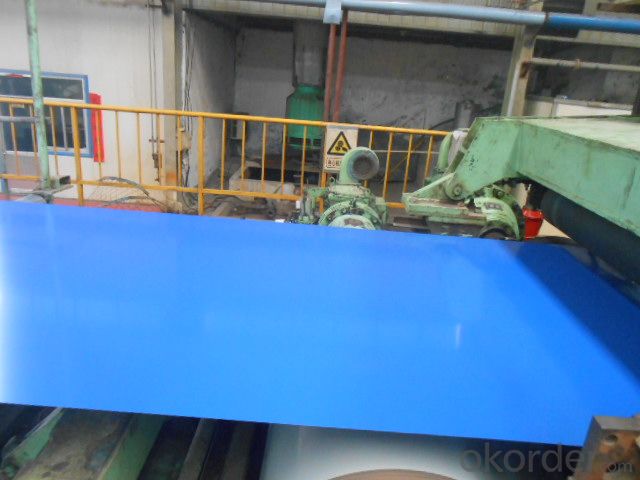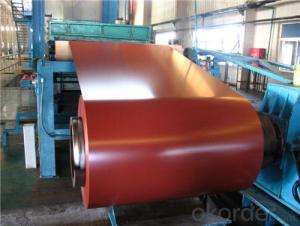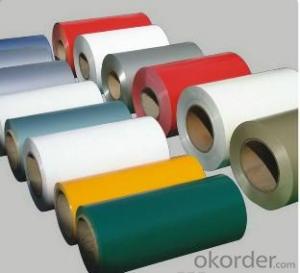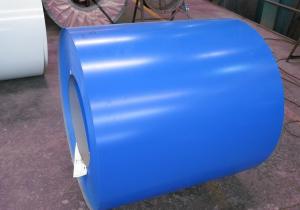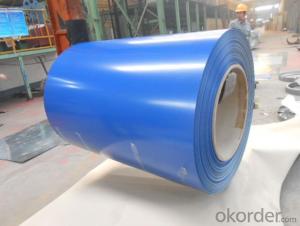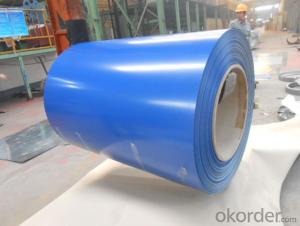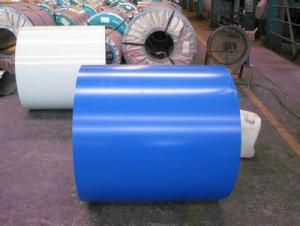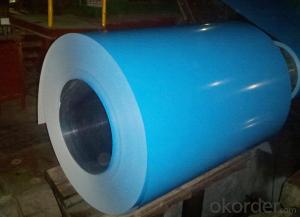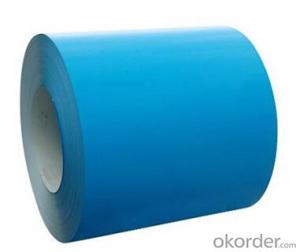Pre-Painted Galvanized Steel Coil High Quality Blue Color
- Loading Port:
- Shanghai
- Payment Terms:
- TT OR LC
- Min Order Qty:
- 100 m.t.
- Supply Capability:
- 20000 m.t./month
OKorder Service Pledge
OKorder Financial Service
You Might Also Like
1. Pre-Painted Galvanized/Aluzinc Steel Coil Description:
With GI as base material, after pretreatment (degrease and chemical treatment ) and liquid dope with several layers of color, then after firing and cooling, finally the plate steel is called pre-painted galvanized (aluzinc) steel. Pre-painted galvanized steel is good capable of decoration, molding, corrosion resistance. It generally displays superior workability, durability and weather resistance.
2.Main Features of the Pre-Painted Galvanized/Aluzinc Steel Coil:
• Excellent process capability
• Smooth and flat surface
• Workability, durability
• Excellent heat resistance performance
• High strength
• Good formability
• Good visual effect
3.Pre-Painted Galvanized/Aluzinc Steel Coil Images
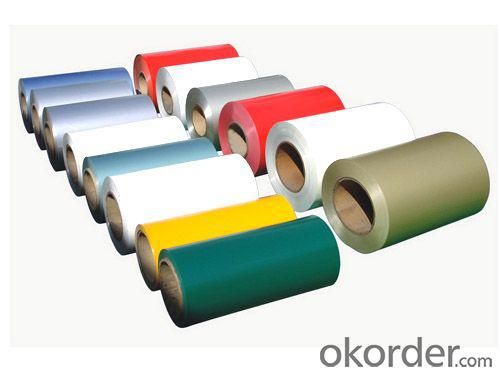
4.Pre-Painted Galvanized/Aluzinc Steel Coil Specification
Standard: AISI, ASTM, BS, DIN, GB, JIS
Grade: DX51D, DX52D
Thickness: 0.17-2.0mm
Brand Name: KMRLON
Model Number: coil
Type: Steel Coil
Technique: Cold Rolled
Surface Treatment: Coated
Application: Boiler Plate
Special Use: High-strength Steel Plate
Width: 20-1250mm
Length: customized
commoidty: pre-painted galvanized steel coil
Thickness: 0.13-4.0mm
width: 20-1250mm
zinc coating: 40-180g/m2
printing thickness: top side: 20+/-5 microns, back side: 5-7 microns
color: all RAL color
surface treatment: color coated
coil weight: 4-7 tons
coil ID: 508/610mm
packaging: standard seaworthy packing
5.FAQ of Pre-Painted Galvanized/Aluzinc Steel Coil
1. What’s the application of this product?
Roof, roof structure, surface sheet of balcony, frame of window, etc.
2. What’s the brand of the paint?
We use the best brand of all of the word—AKZO.
3. How about your company?
A world class manufacturer & supplier of castings forging in carbon steel and alloy steel,is one of the large-scale professional investment casting production bases in China,consisting of both casting foundry forging and machining factory. Annually more than 8000 tons Precision casting and forging parts are exported to markets in Europe,America and Japan. OEM casting and forging service available according to customer’s requirements.
4. How to guarantee the quality of the products?
We have established the international advanced quality management system,every link from raw material to final product we have strict quality test;We resolutely put an end to unqualified products flowing into the market. At the same time, we will provide necessary follow-up service assurance.
5. How long can we receive the product after purchase?
Usually within thirty working days after receiving buyer’s advance payment or LC. We will arrange the factory manufacturing as soon as possible. The cargo readiness usually takes 15-25 days, but the shipment will depend on the vessel situation.
- Q: i have purchased a high dollar Martin guitar and i was wondering if there are many people out there that have used steel string acoustics for classical and flamenco guitar playing.otherwise i will need a nylon stringeror.. uld i put nylon strings on an old yamaha steel string guitar that i have?
- Guitars built for either nylon or steel strings are constructed differently. You will have problems putting nylon strings on a steel stringed guitar and visa verse. I say NEITHER is a good idea. If I were in your shoes, I would walk on line or to a guitar store and purchase a nylon stringed guitar. That's what I did years ago and now I am hooked. I got a second hand Takamine A/E that work just fine for a couple hundred and then just a yr or so ago I got a brand new one, an EC132C and I just LOVE it. As my skills improve I plan on upgrading to a custom built acoustic only with a cutaway. I like cutaways but not the electronics. I never plug into my amp hardly at all. Yamaha makes nylon guitars too VERY cheap and real good tonal quality, I was VERY impressed with one that I played. I upgraded my tuners on my new Takamine to Schaller 16:1 and put the old Takamine tuners on that Yamaha and it's a really nice little guitar to kick around on when I am at that person's place.
- Q: I need a machine which can produce steel pipes, but I don't know where to look...If you want me to state dimensions etc. just say...Thanks :)
- Gary's okorder /
- Q: I know of the cheaper steel shot for waterfoul hunting, but there is more expensive shot available. Is it worth the money, how much more distance are we talking, and what do you like the best?(brand name)
- In my experience with steel shot, I found that the higher quality stuff usually just patterns more consistently. Although I prefer Federal, any of the other major manufactuers are also great.
- Q: How are steel coils used in the production of agricultural trailers?
- Steel coils are used in the production of agricultural trailers as they are formed into various structural components such as frames, chassis, and supports. These coils are cut, shaped, and welded to create a sturdy and durable trailer structure that can withstand heavy loads and rough terrains commonly encountered in agricultural operations.
- Q: Classify the following in as many ways as possible:stainless steelpureheterogeneous mixturehomogeneous mixturenone of these
- homogeneous mixture
- Q: I have a 03 jeep wrangler and looking to upgrade to black wheels. I was wondering if the difference between steel and alloy wheels is worth paying double.
- steel is steel is steel- they will always be heavy you would have to weigh them to find out--NOW if you are going to alloy wheels they are typically aluminum and yes they are lighter -this is good because it lightens your un-sprung weight and is less harmful to your suspension-good for your auto
- Q: How are steel coils used in the production of storage racks and shelving?
- Storage racks and shelving heavily rely on steel coils during their manufacturing process. These coils, typically made from high-quality steel, are rolled into long, continuous strips. The steel coils undergo further processing to transform them into sheets or strips, which are then used to construct the frames, shelves, and other structural components of storage racks and shelving systems. Initially, the steel coils go through a series of machines to unwind and flatten them, ensuring uniform thickness and width. This step enables manufacturers to obtain steel sheets or strips with consistent dimensions, which are vital for producing storage racks and shelving that meet specific design specifications and structural requirements. After flattening and cutting the steel coils into desired sizes, they undergo additional processing to incorporate necessary features and characteristics. This may involve bending, punching, or welding the steel to create desired shapes, such as uprights, beams, or brackets for the storage racks and shelving. These components are then assembled to form the framework of the storage system. The durability and strength of steel make it an ideal material for storage racks and shelving. Steel coils provide the essential structural integrity and load-bearing capacity needed to support heavy items and endure regular use. Additionally, steel is resistant to corrosion, ensuring the longevity and reliability of storage racks and shelving systems. Furthermore, steel coils can be coated or galvanized to enhance their resistance to rust and corrosion. This protective layer helps maintain the visual appeal and structural integrity of the storage racks and shelving, particularly in environments with high humidity or exposure to moisture. In conclusion, steel coils play a crucial role in the production of storage racks and shelving. They serve as the raw material for fabricating various components, guaranteeing the strength, durability, and load-bearing capacity necessary for these storage systems. The versatility and adaptability of steel allow manufacturers to create storage racks and shelving that meet specific design requirements and provide long-lasting storage solutions for a wide range of applications.
- Q: How are steel coils used in the production of metal facades?
- The production of metal facades relies on steel coils as a vital element. These coils, typically crafted from high-quality steel, serve as the raw material for manufacturing different components of metal facades, including panels, cladding, and roofing sheets. During the production process, the steel coils go through a series of procedures. Initially, the coils are uncoiled and flattened to achieve a smooth and uniformly thick surface, ensuring the desired texture for the metal facades. Subsequently, the flattened coils are cut into specific lengths and widths, tailored to meet the design requirements of the facades. After the cutting process, the steel sheets undergo various surface treatment techniques, such as cleaning, pickling, and coating. These treatments are crucial in enhancing the durability and corrosion resistance of the metal facades. The coatings are applied using different methods, such as galvanization, powder coating, or painting, depending on the desired finish and level of protection needed. Once the surface treatment is completed, the steel sheets are shaped and formed into the desired profiles for the metal facades. This can involve processes like roll forming, bending, or stamping, depending on the complexity of the design. These shaping processes give the metal facades their distinct appearance and structural integrity. Finally, the formed steel sheets are assembled and installed onto the building structure to create the metal facade. The installation techniques employed include welding, riveting, or adhesive bonding, depending on the specific project requirements. Thus, the steel coils play a critical role in providing the necessary raw material for the production of metal facades. These facades not only enhance the aesthetic appeal of buildings but also provide protection and durability against harsh weather conditions. To summarize, steel coils are indispensable in the production of metal facades as they serve as the raw material for various components. They undergo surface treatments to enhance durability, are shaped into desired profiles, and finally, installed to create the metal facade.
- Q: Cold rolled steel coil steel, what is the difference?
- Steel rolling process is different from the steel produced naturally different!
- Q: I have steel on my 9.5 ti now.. ive heard about synthetic being stronger but it snaps when it hits something sharp.. opinions people?
- I okorder
Send your message to us
Pre-Painted Galvanized Steel Coil High Quality Blue Color
- Loading Port:
- Shanghai
- Payment Terms:
- TT OR LC
- Min Order Qty:
- 100 m.t.
- Supply Capability:
- 20000 m.t./month
OKorder Service Pledge
OKorder Financial Service
Similar products
Hot products
Hot Searches
Related keywords
